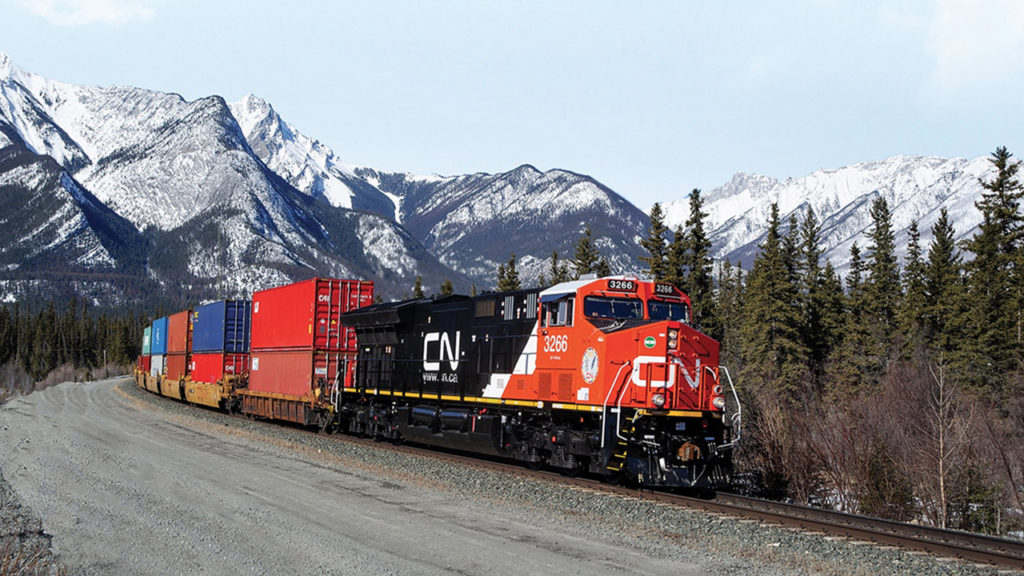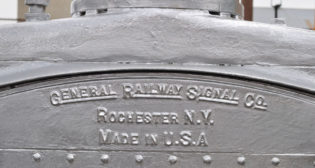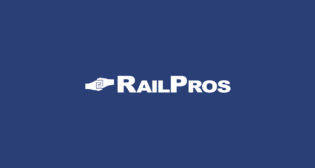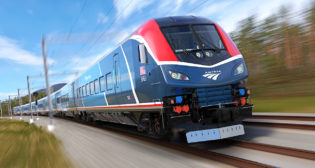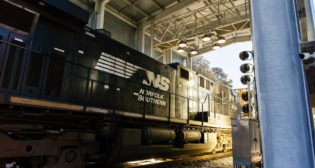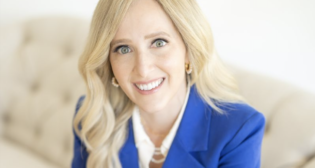
2024 Railroader of the Year: Tracy Robinson, CN
Written by William C. Vantuono, Editor-in-Chief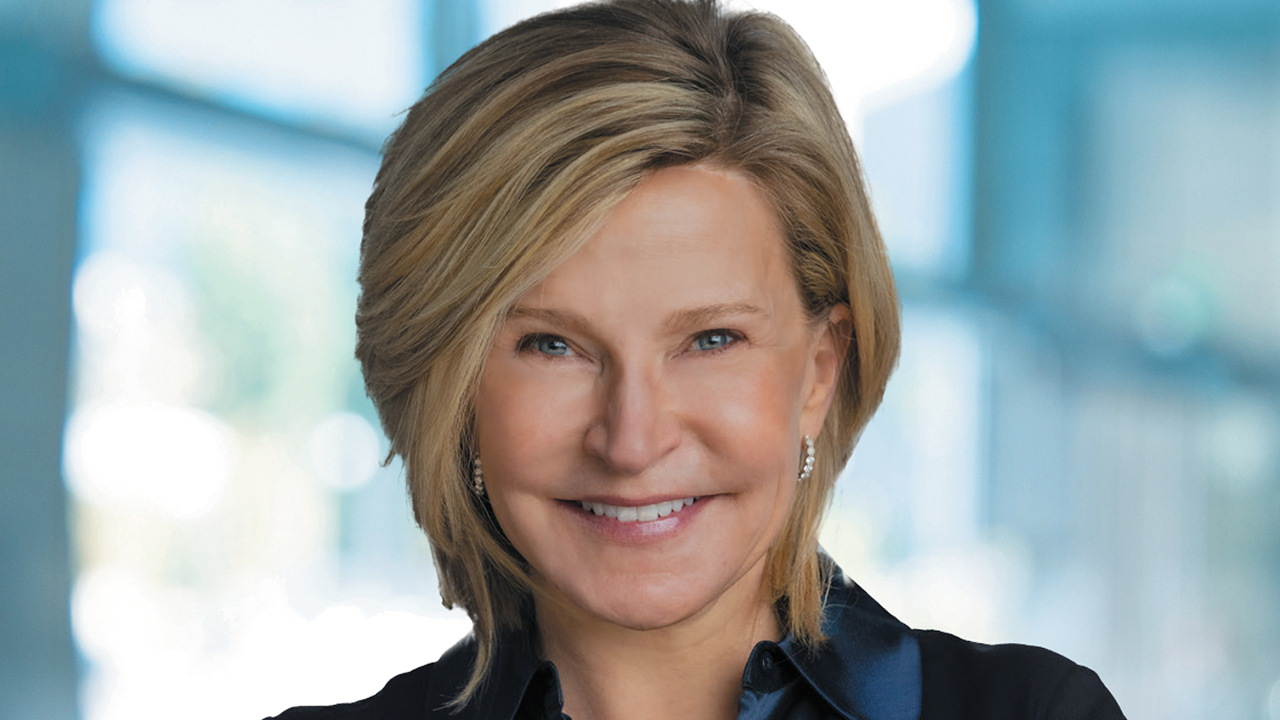
Tracy Robinson. CN photo
Railway Age’s 2024 Railroader of the Year Award, the 61st annual, goes to an experienced and highly respected North American rail industry leader: CN President and Chief Executive Officer Tracy Robinson.
Robinson continues the sweeping leadership evolution the railroad industry has been undergoing for the past few years. She continues to break new ground, bringing fresh ideas and a perspective based on change, growth, and service. She is leading CN during challenging times, strengthening and transforming the company and solidifying its position in the North American and global supply chains. While she brought many years of experience to CN, including leadership positions at Canadian Pacific and in Canada’s energy sector, she is dedicated to developing a new generation of railroaders from diverse backgrounds.
Robinson was named President and CEO of CN in February 2022 following more than 30 years in Canada’s railroad and energy industries. She joined CN from TC Energy, where she was Executive Vice President, and President of Canadian Natural Gas Pipelines and Coastal GasLink. Prior to joining TC Energy, Robinson spent 27 years at Canadian Pacific, including in executive roles spanning Commercial, Operations and Finance. She holds a Master of Business Administration from the University of Pennsylvania Wharton School of Business and a Bachelor of Commerce from the University of Saskatchewan. Among many honors, she was named the 2023 New CEO of the Year by The Globe and Mail Report on Business magazine.
Robinson will be presented with the Railroader of the Year Award on March 12, 2024, at the traditional dinner at the Union League Club of Chicago, hosted by the Western Railway Club.
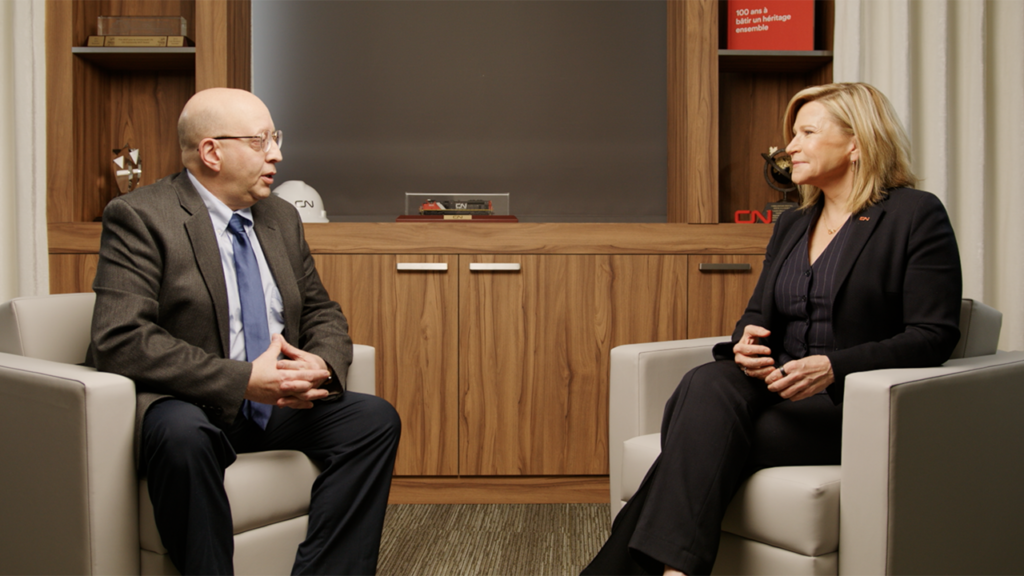
RAILWAY AGE: Tracy, on behalf of Railway Age and Simmons Boardman Publishing, congratulations. It’s a well-deserved honor.
TRACY ROBINSON: Thank you, Bill. It’s great to be here with you today. And thank you and your team at Railway Age for all that you do for this industry. I’m an avid reader.
RAILWAY AGE: You’ve been in the industry for quite some time starting with Canadian Pacific a while ago. What brought you into the rail industry? What attracted you to it?
TRACY ROBINSON: I grew up on a farm in southern Saskatchewan, and when you’re farming, the railroad is always central to what’s going on in the community. And I would say farmers don’t often think highly of the railroads, and that may not have changed over the years, but certainly I knew how important they were. So, when I went off to university, Canadian Pacific was recruiting on campus, and I wanted to do something that was important. I knew they were important, certainly important to the community I grew up in. I learned that they were important to the agribusiness, but they were also important to a lot of other businesses, whether it’s automotive or forest products. And that was exciting, to be in the middle of all of that.
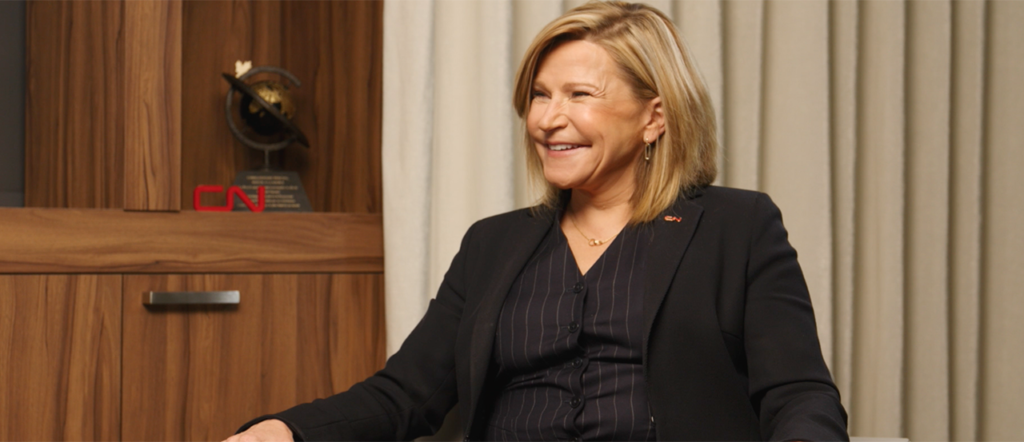
RAILWAY AGE: Tell me about your career. You were in many areas. You spent 27 years at CP in various roles.
TRACY ROBINSON: CP is a great organization and it’s got a great history and place in Canada, and they gave me the benefit of an incredibly diverse set of experiences, both internally and in dealing with several different types and groups of customers. I started as a sales rep in Regina, Saskatchewan. I sat in the operations office, and my job was to knock on loading dock doors and try and figure out how we get the next piece of freight, which was exciting and a good way to learn the railroad from the ground up. And then I spent several years in marketing and sales in Calgary and in Vancouver and then Edmonton in asset management, which allowed me to touch a few industries. I came here to Montreal after that and spent a few years as the assistant chief of staff to the CEO and the president at the time.
We were creating at the time the very first for CP service design organization, which put me in the middle of that. And then into operations, leading the transportation service centers for the network in Canada and the United States. Then, customer service, over into accounting, then I became treasurer. I went back into commercial to lead the coal business and then the merchandise business. It was a unique set of experiences that allowed me to develop an appreciation for how the work really gets done, in a better enterprise view of our business and of leadership.
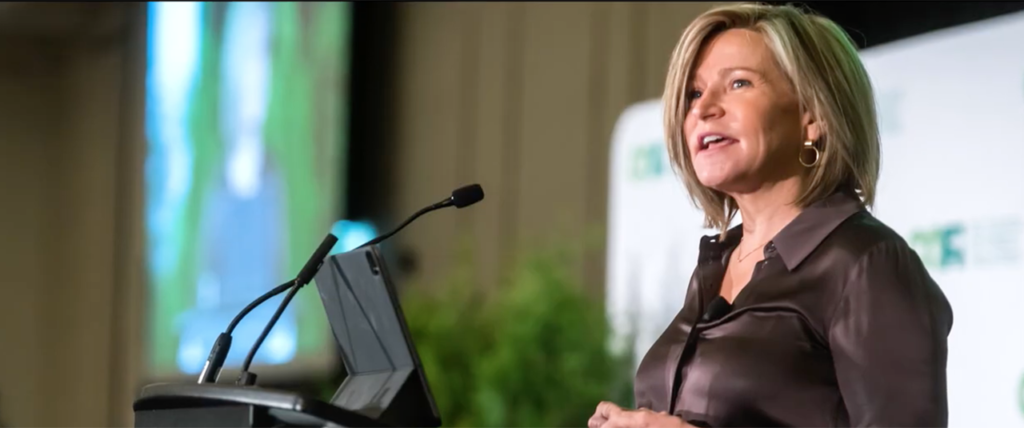
RAILWAY AGE: So, you came into the industry at a relatively important time of growth. You were there during the time when railroads were able to grow their business.
TRACY ROBINSON: Grow our business, become important to our customer’s ability to grow their business, and to learn how to do it effectively but also efficiently. We could start to price differently. We could start to differentiate ourselves and think about how we wanted to get our customers’ products to market. It was an exciting time. There are not very many new businesses that the railroads get into, but over the years there’s been a few of those. It was crude by rail. Now we’re into the precious minerals. We’re now hauling lithium out of northern Quebec into the whole E battery and EV market. The railroads are traditional, and they’ve been around a long time, but there’s still a lot of new stuff going on.
RAILWAY AGE: A lot of changes. I remember crude by rail very well when the Bakken crude had this big peak and then it leveled out. But I think the industry at that point proved that it’s a good piece of business.
TRACY ROBINSON: It’s a very good piece of business. But as railroads, we excel when we know what’s coming at us. Our supply chain can do pretty much anything when we know what’s coming at us. And we like long-term sustainable business because we invest significantly with our customers in these businesses. Crude by rail has been an interesting adventure. It did peak and come off, but I think we’re finding the sweet spot of the natural role that rail should play over the longer term, and that’s the right spot to be in.
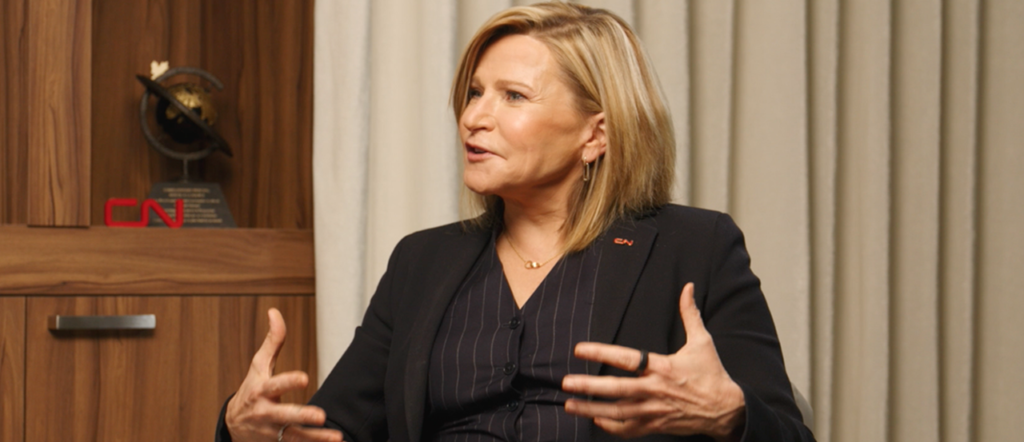
RAILWAY AGE: Looking ahead, everybody talks about, “We need to grow business; we need to grow traffic; we need to grow market share.” Where do you see the growth? Where are the opportunities not only for CN but also for our industry as a whole?
TRACY ROBINSON: We talk about growing the business because we power the economy. If the railroads aren’t performing and if they’re not adding to the capacity where our customers need it, the economy is not going to grow. But if we can be in a position where we can help the economy grow, we’re also going to grow. So that means you need to start with that foundation of a strong, consistent operation and service to your customers. But especially these days, you need to be very close with your customers around how they’re trying to build their business and what the opportunities are. It’s a long lead time these days to get new capacity in place, whether it’s track or whether it’s cars or locomotives or even people. And so, the closer we are to our customers and to the industries, and the more we know about where flows are going to go, the better partner we can be. But that’s how we grow.
RAILWAY AGE: Part of that is leveraging advanced technology. CN is doing some very innovative things with automated track inspection in revenue trains, and a lot of initiatives via inspection portals. This is all good. But the public doesn’t really see how technologically advanced this industry is.
TRACY ROBINSON: We’ve been watching trains for our entire lives, but we don’t realize how much technology is in this operation now. The biggest change between the time when I stepped out of the industry and came back is the advancement in technology. It’s important to lean into for several reasons. We aspire to zero harm in our company, which means environment. It means people and communities. We need to keep our rail operations safe, and technology plays a big role in doing that. But if we’re going to operate consistently, it means we need a minimal amount of disruption. Wayside detection that’s checking on the equipment as the trains go by, and the health of the equipment. Seeing things you cannot see with the naked eye. The ability to do that and then intervene before something happens. The ability to have our ATIP (Autonomous Track Inspection Program) cars move in merchandise trains, move over our track constantly, detecting early defects in the infrastructure so that we can get at those before there’s any incident. That’s incredibly important to safety and to efficient operations across the whole network. It’s amazing what we’ve been able to accomplish so far, but I think we’re just really scratching the surface.
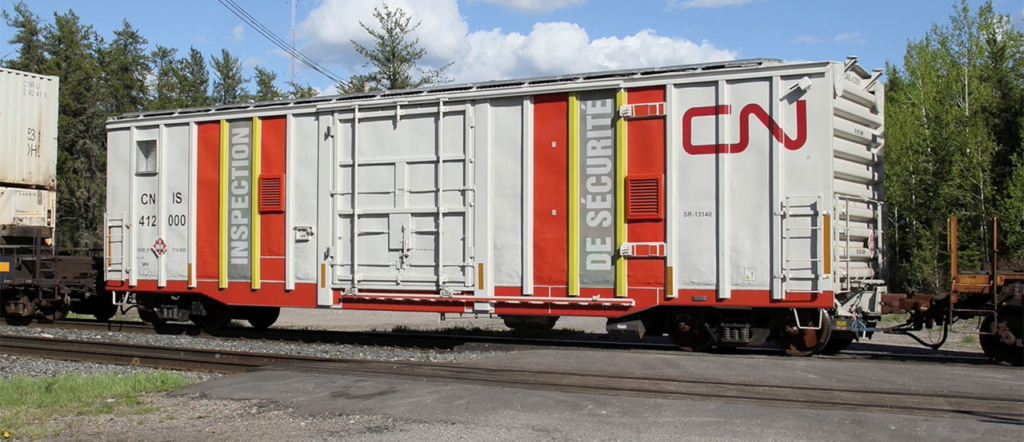
RAILWAY AGE: There is a regulatory difference between the U.S. and Canada. How do you find balancing those differences being that CN as a network touches two countries?
TRACY ROBINSON: Indeed, in many ways we’d like to believe that the border doesn’t exist. We operate very fluidly, and in this industry, as you know, we all exchange equipment and locomotives. That all operates very fluidly. The regulatory environments are different at different times, but largely they move as one in the same direction. And that’s important because we’re one network across the continent.
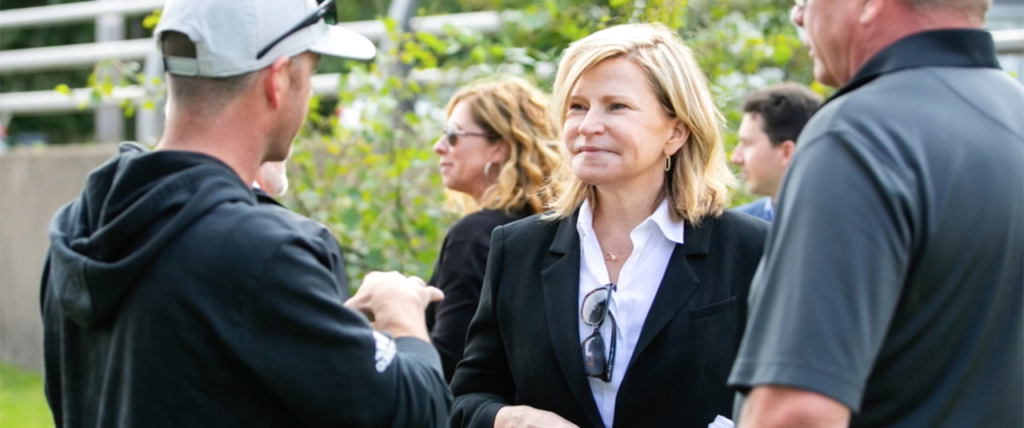
RAILWAY AGE: I wanted to go back and talk about your time at CP. Who were some of your mentors?
TRACY ROBINSON: Well, we would be here a long time if I talked to you about everybody I learned something from along the way, but I’ve had the ability to move across functions and touch the business differently. There were very different kinds of leadership styles across some of those parts of the company. I met people who taught me a lot about the specifics in individual areas, and I met people who importantly taught me a lot about how to bring all of that together. And so it’s the sum total of all of that, the right kind of nudging, the right coaching and counseling at the right time. That’s really been a gift to me. We’re all a product of the environment that we grew up in. For me, I grew up at CP. I grew up in rail. At CP, it was the management team, but also the people that you work with every day who teach you about the business and teach you what good looks like, and it becomes a family. So coming back to the industry, it felt very much like coming home.
RAILWAY AGE: A lot of people say the industry is a big family. For the most part, we get along. You spent 27 years at CP and then you left the industry to go work in Canada’s energy sector. What prompted that?
TRACY ROBINSON: It was when I was handling the merchandise portfolio in the crude by rail days. Generally, we were selling to either producers or refiners or the marketers. And our pitch was, we could be nimble and move across markets and move quickly, but it also occurred to us that we could be helpful from one origin to one destination, but in advance of the pipeline being built. Or, we could offer some flexibility in how they deliver services to their customers. Trans Canada Pipelines, now TC Energy, was part of that and they were receptive. That led me to join their organization to help them think through what those options were. They never ended up getting in the rail business, but it opened the next door for me on learning another business that had a lot of similarities, and a lot of differences. It’s a long linear infrastructure. It’s regulated, very safety sensitive. But a lot of differences. It’s an important industry and I learned a lot being there. This whole concept of where we get our energy from and where that’s all going to go is a fascinating world to be in. I’ve had the pleasure of running the Canadian natural gas pipelines and learning how to build pipelines.
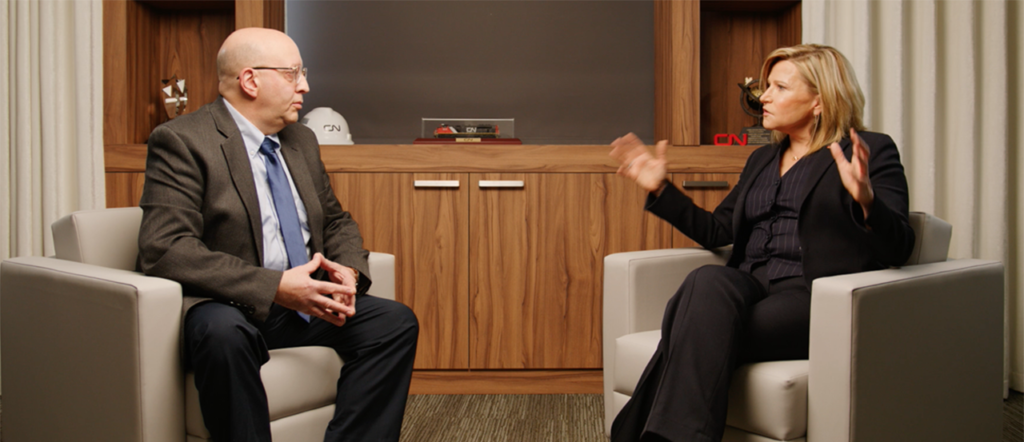
RAILWAY AGE: I’ve spoken with people in the industry who have known you for a long time and either worked with you or competed with you, friendly competition. Everybody without exception says how much they admire and respect you and have a lot of good things to say about what it was like to work with you or compete with you at the other carrier.
TRACY ROBINSON: I appreciate that. Everything I know I learned from those people and continue to learn as I came over to CN and work with an equally impressive group over here. There is nothing that happens in an organization like a big railroad that is as complex, has all the moving pieces. It’s an outdoor sport. It’s a team effort, and the people I grew up around are the best in the business. And it’s an honor to be a product of that kind of environment and have the opportunity now to put me with the rest of the leaders in the industry, to put our fingerprints on where we take it next. But I think it’s important that, when we come to our work every day, we realize that our bigger purpose is to move the economy. And that means that there are times where the most important thing we can do is work very well together. And sometimes it means that we’re going to compete a little bit on the business that we move, or in different ways. And as leaders, we need to know and be good at distinguishing between when we should be doing one and when we should be doing the other, and to be able to do both and still have a tremendous amount of respect for each other.
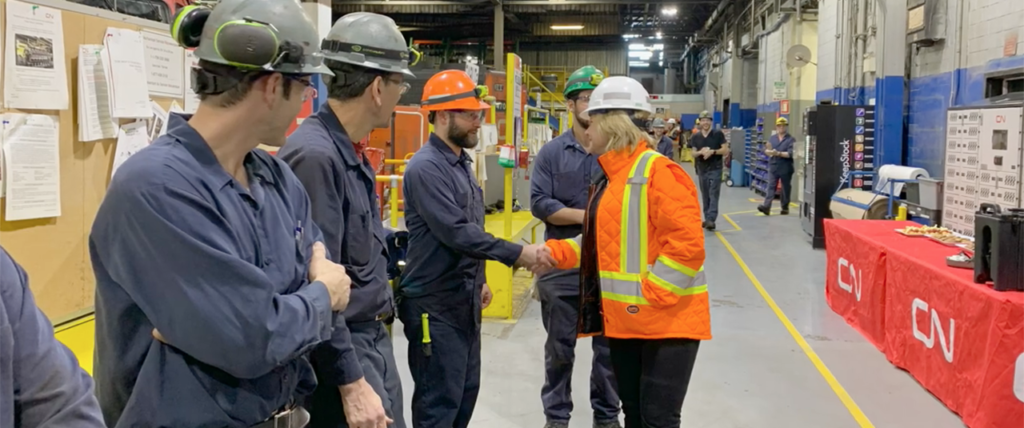
RAILWAY AGE: One of the people who helped you out was Ed Harris, back out of retirement. He passed on the torch to two younger people. That’s kind of an unusual move, the way the operating department is now: two people working closely together in different functions.
TRACY ROBINSON: Ed and I have known each other for quite some time, and I have a great appreciation for his skills, the way he looks at this railroad. He knows this railroad very well and the way he thinks about the business, but also how he leads and what his values are. And that was important to me as I figured out who I could invite in to help us think through the next generation of the operations team. He did me a great favor in coming in. He knew our team very well, and he was a great thought partner on how we could structure this in a way that would make sure that we don’t take our eye off the operating ball while we’re growing. It’s important that, with this operating cadence and the level of customer service we have achieved, we don’t lose that as we turn to growth.
We decided we would differentiate, create two very different kind of organizations. One is focused on the day-to-day execution. There’s a lot that goes on out there every day. We’re all involved in it. And that takes a lot of focus in the moment and day-to-day. Separately, we need as equal and as strong a focus on the future. Running the scheduled operating plan means a plan is made at the center of network operations to optimize the whole. And it is constantly being revised, because there’s new business coming on or the business is changing. But we need to be looking five years out and further, around what we think the business is going to look like.
Then we need to have the track infrastructure and capacity up to standards. We need to have the locomotive fleet, we need to manage the crew base and the employee base, all of that through a longer-term lens. These are two very different pieces of work, and we can’t distract either of them from their purpose, which means that we have Derek (Chief Field Operating Officer Derek Taylor) and his organization every day out there delivering the plan, running the plan. We’ve got Pat (Chief Network Operating Officer Patrick Whitehead) and Derek and his organization every day working on the plan and looking forward to making sure that we’re set up for the future. I think that this is the right way to structure our organization as we look to maintaining our customer service levels and growing.
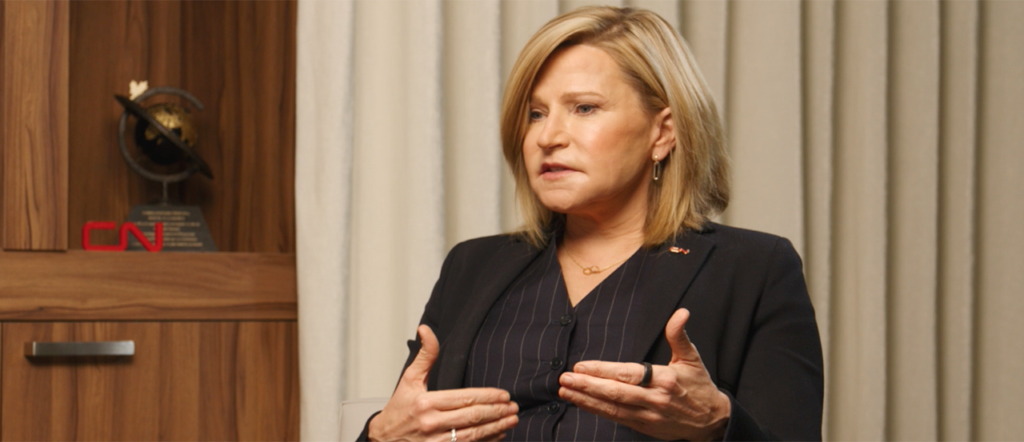
RAILWAY AGE: Railroads must be nimbler to keep and grow market share. It’s a heavy lift, but it can be done with the right mindset.
TRACY ROBINSON: I think the world is different and things are changing. We must change with it and be as ahead of it as we can. You’ve made the point: We need to be nimble. Who knew that a war in Ukraine would suddenly change where we need to move grain or would cause the price of lumber to triple, and mean that it must move differently? We need to be able to pivot. We need an organization and a team who has a different perspective and isn’t afraid to step into those kinds of things and get it done. But we also need to know who’s doing what. Part of the structure of our organization is around who’s making the plan and who’s executing the plan. And we think that that makes us far more adaptable and nimbler in the moment. And I think it’s proving out.
We had an interesting year with a serious forest fire season up here in Canada, in the northern part of our network. As I understand it, it was worse than it has ever been. And it was tough on our customers whose facilities were impacted. It was certainly difficult for us. And we had a two-week port strike on the West Coast. But if you look at our operating performance, it was consistent. We figured out the plan that was constantly evolving through that period and the execution, and got it done. And I think that was a real test of the resilience of our plan. These days, resilience is incredibly important.
RAILWAY AGE: I well-remember the Canadian wildfires because the smoke came all the way down to where I live in New Jersey. With climate change, global warming, rising seas, whatever you want to call it, weather has gotten more extreme. Railroads are well equipped to deal with that. We’ve seen instances where there have been landslides and track washed out and fires and other things, and the railroads are able to come right back.
TRACY ROBINSON: There’s no better organization than a railroad when it comes to a crisis. The ability of our teams to get track back in shape to run and to deal with whatever is going on around it is amazing. It’s a hallmark of the industry. What we’re trying to make sure is that while we do that, we don’t distract from the longer-term work as well. We’re distinguishing between that capability, which is critical, but also the capability to look forward. Things are changing very, very quickly and we need to be able to anticipate it. We need to be able to see around corners these days.
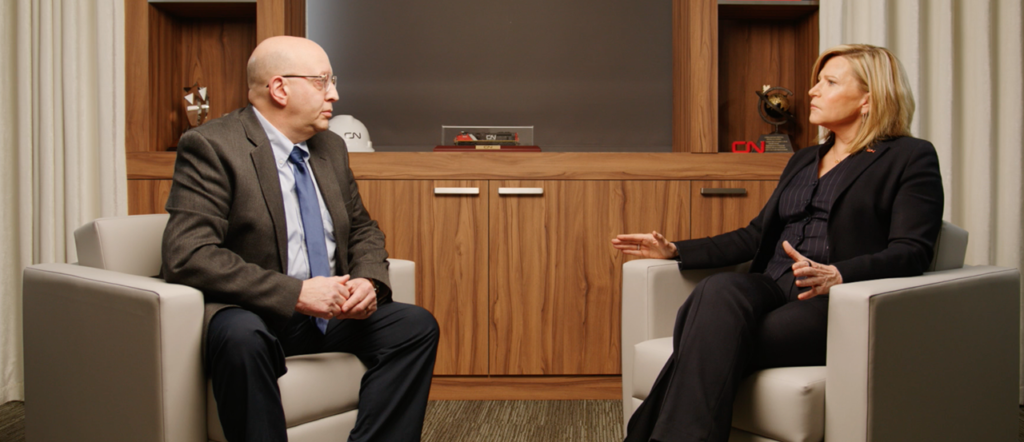
RAILWAY AGE: Everybody in your position has a long-term vision, long-term goals. What are yours, now that you’ve come back into the industry?
TRACY ROBINSON: As I come back into the industry and consider what’s going on around us and what we’re going to need to do to step into the role we need to play in the economy, there are a number of things that we’re doing a lot of work on. One is this aspiration that we have around zero harm. We believe there should be no harm to the environment, no harm to our employees in coming to work every day. And there should be no harm through the work that we do to the communities in which we live. We want to be a net-positive benefit. That takes culture, that takes technology. There’s lots of opportunity, but it also takes leadership to set us on that path. I think it’s something you’re seeing the industry focus on, and it’s critical.
It’s a much more complex stakeholder environment than when I started in this business. That’s mission number one. But beyond that, as I speak to our customers across every industry, I think a lot about our ability to help them be successful. That’s the growth part. If we’re going to power growth in the economy and the continent, it means we need to be good at a couple of things. We need that consistent operation where our customers are getting consistent service they can count on. For us in this railroad, that means the commitment to the scheduled operating model, with a focus on the velocity of the assets that helps service our customers but also helps us use our capacity effectively. And it means that we need to be a lot closer to our customers around where they want to grow. It’s difficult for us to be surprised, so we need to be with them early on when they’re making decisions and understanding what markets they’re going to be trying to get to so that we can have the capacity in place.
We need to think about the fact that supply chains are more complex than just railroads. We all need to run good railroads. But our customers and industries need good supply chains. This means we need to integrate in better ways through data, through technology, through business process, with our partners at the other railroads and up and down the supply chain, whether they’re terminals or ports or warehouses or shipping lines, and with our customers, so that we can figure out how to make that supply chain work, to perform and have the capacity that our customers need, when they need it. It’s zero harm. It’s how we figure out growth for the economy, and it’s how we build this next generation. When I look around, it’s hard not to notice that these are the folks that are going to be running the place next. And that deserves a tremendous amount of effort and focus for us in how to get them ready to handle all of this.
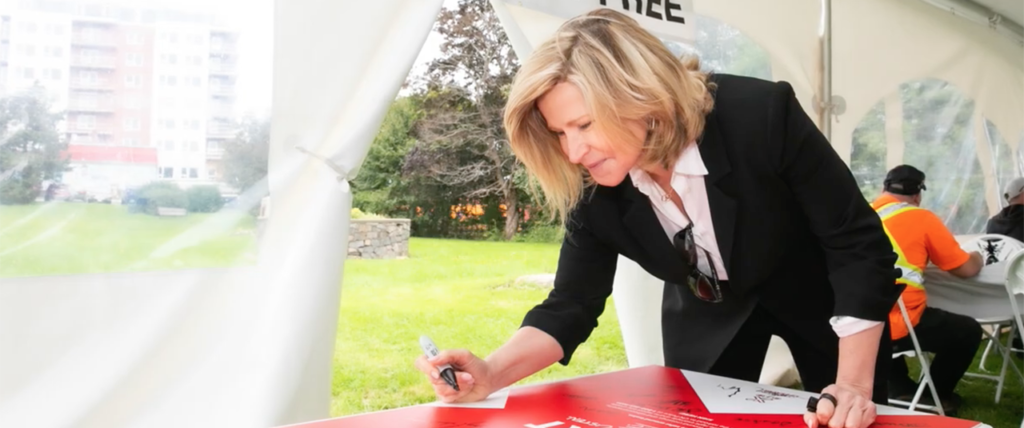
RAILWAY AGE: As you well know, the demographics in this industry are changing. We have far more women in leadership positions. You’re an example. Attracting younger people, more diversity in terms of whether it’s ethnic background or whatever, is good to see. We ran our first live Women in Rail conference in Chicago in November, and the response was tremendous. It was very gratifying to see all the energy in the room from women of all ages, a lot of young women who are new to the industry, and some who have been in the industry a long time. The camaraderie, the energy there. It’s really satisfying. It must be gratifying for you.
TRACY ROBINSON: Thank you for doing that because it takes all of us. I know several of our people were involved in that event and came back with that energy you’re talking about. It’s good to see the momentum coming, but we must go faster. Our industry trails in this, as you would know. And I’m a strong believer that if we are going to succeed in the future, we need to lean into diversity. It’s the right thing to do, but there’s also a strong business imperative for it. We need those different perspectives and different backgrounds coming together in the right way. This business is changing, and the culture needs to change as well. We need to come together differently. But I would argue that the size of the future workforce is not as big as it was in the past.
I want to make this industry the place that people want to work, to make CN in particular the place that people want to work. No matter who you are, everyone is welcome at CN. I want to help get people as excited as I am about getting up every morning and making this work for our customers, for our industries, for the economy, for the country and the continent. It’s a great purpose to rally around. These are the kinds of experiences you can have. Working in an organization like this is tremendous. I’ve benefited from it. I’m going to make those same kinds of opportunities available to others around here, and we’re looking to be the place to work.
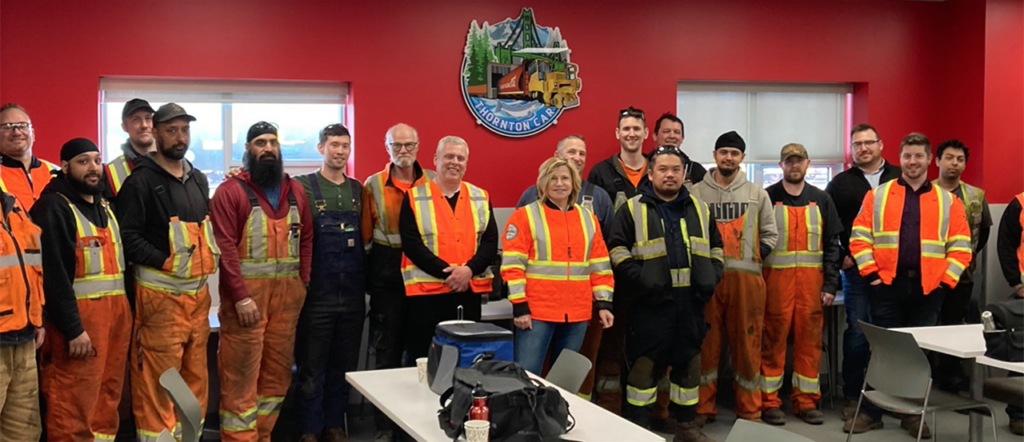
RAILWAY AGE: That’s one of the best things you can do. One of my mentors, my predecessor, the late Luther S. Miller, said the best thing you can do as a senior person, a leader, is to prepare the people who are coming up behind you to do your job someday. I believe strongly in that. I think you do, too.
TRACY ROBINSON: Very much so. These jobs aren’t easy. Most jobs I’ve had, at the time weren’t easy. But they’re gifts, and opportunities to learn. The best thing we can do for those coming up is to make sure that they’ve had the set of experiences and the exposures and the wins and the failures and the scars that come from that. Build character so that you’re ready for these roles when you step into them. There’s that opportunity, but there’s also the opportunity, if those aren’t the kinds of things that you aspire to, to have a great career and touch all kinds of things. This is a great place to be for that as well. We’ve done a lot of things in this company over the past couple of years to help our employees get to know each other again and to realize the family piece, the caliber of the quality of the people that they’re working next to. To get excited around what we get up to do every day and to want to be part of this. If being in this role helps people realize that these jobs are available, that they’re not easy, that they take a lot of effort and a lot of experience, but they’re available if you want them, that’s a great thing to be doing.
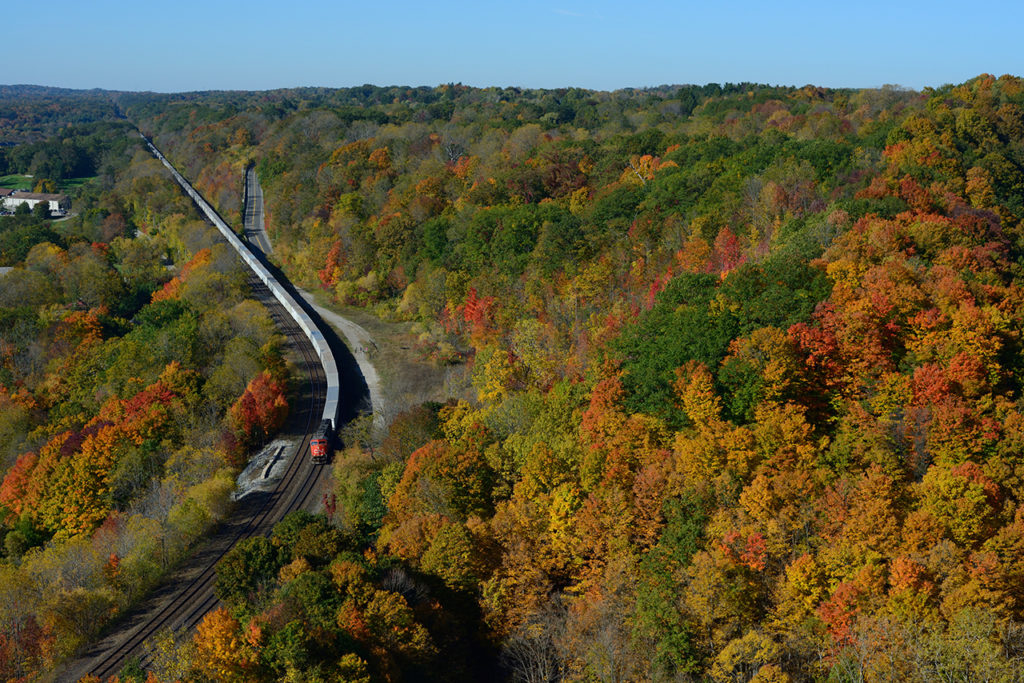
RAILWAY AGE: I often paraphrase John F. Kennedy, who I admire very much because he set the United States on the track to go to the moon: “We choose to be railroaders, not because it is easy, but because it is hard.”
TRACY ROBINSON: Exactly. I’ve been in very difficult situations in my career. I talked to a lot of people in those moments. You must realize that you can’t buy experience like that. You can’t buy development like that. We should all be embracing the difficult because it’s what makes us capable of taking on the next thing when the world is so complex, moving quickly. We need people who have been there, maybe not in that exact situation, but who know that the difficult is important, and that if we come together in the right way, anything is possible. I’m an optimist and I can see a glorious future for this next generation. Think about technology that we can apply. Think about the different ways that we can work with our frontline employees that run trains every day or fix track or figure out the next locomotive. If we can all come together and be excited about the way we do that, but appreciate the difficulties and what they make possible, then I think we can do anything.
RAILWAY AGE: This past year, 2023, was difficult for the industry. It was put in spotlight by one accident. Look at all the scrutiny and a lot of the politicizing of not only that, but also a lot of other things that were going on. But I think brighter days are ahead. And we’re seeing very strong signs of that. Service is improving, traffic is coming back. I think as an industry, we’ve weathered the storm, not that the storm is over because there’s always something going.
TRACY ROBINSON: It is important not to lose the benefit that comes from every problem in every crisis. There are lessons to be learned. I am proud of the industry and the way that we rallied around all that’s come from that event and the new processes, procedures, and technologies that we’re putting in place. I share your view that the future is bright and that as we come together, we are going to figure out how to make sure that our customers are served properly every day, that we can help them and us grow as the economy grows in North America, and how to make the place that our employees want to come and work and learn and challenge themselves every single day.
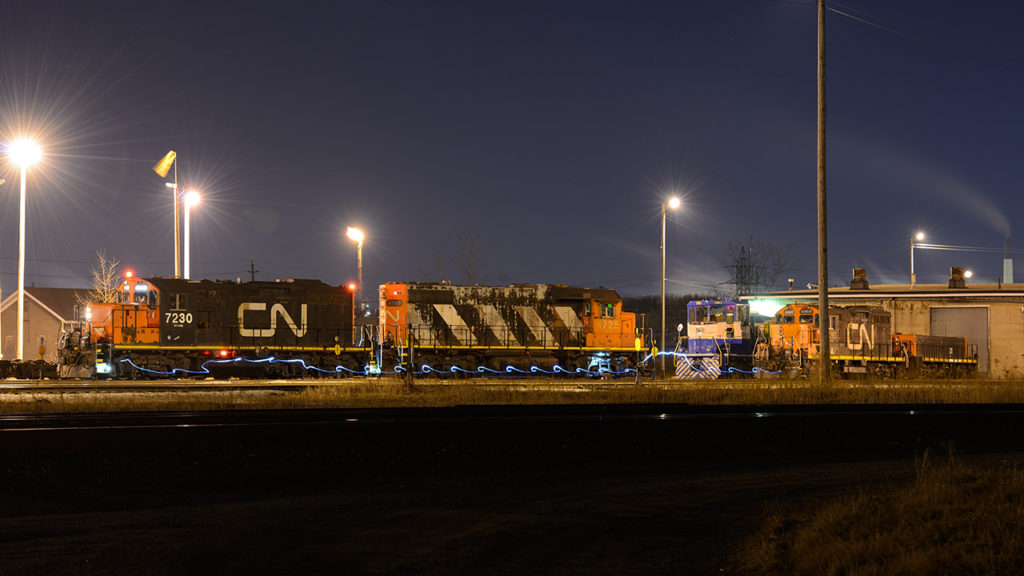
RAILWAY AGE: CN has a lot of partners. There are some good examples of that, the Falcon Premium Service with Union Pacific, for example. You’re also growing the network.
TRACY ROBINSON: We like to think about different ways that we can use our network to bring the right services to our customers. Sometimes that’s our own network. Sometimes it’s working with the other railroads like the FXE and the UP, which has been a great partnership in trying to pick up some truck market share. We’ve also announced a partnership with Norfolk Southern. We want to be open for business, and we look at it through the lens of what’s good for our customers. Sometimes that takes you down the path of coming together in different ways. We have a partnership now, a joint venture with the CBNS in Nova Scotia that’s going to help us with our growth over the long-term in the East. And now there’s the acquisition of the Iowa Northern. That’s exciting for us. It’s a great regional operation. They’ve done a tremendous job of providing solutions and growing with their customers. Coming together is going to allow that customer base to get access to market in a much more efficient way. And we think that brings benefits certainly to the holders of the Iowa Northern, but also to their customers. We’re excited about it.
RAILWAY AGE: I think, Tracy, that many years from now, you’ll be able to look back on your career and say you feel good about it, that you’ve made a difference. I think a lot of people in the industry will say, “Tracy Robinson. I remember her. She drove change. She helped us.”
TRACY ROBINSON: Thank you. I hope that’s true, but it takes a lot of people to get all of that done. And I’m proud of who I’m sitting with here at CN. It’s only as we come together that any of that happens. Thank you.
